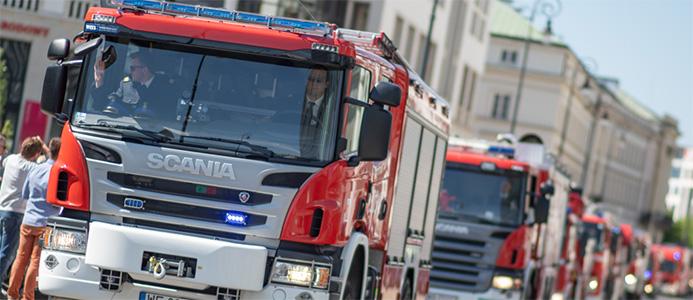
Overview
The act on crisis management establishes the composition and functioning of the crisis management system and specifies the tasks to be conducted by the state administration and territorial self-government units at all levels.
The leading crisis management authority is the Council of Ministers. In urgent situations, this responsibility lies with the Minister of Interior and Administration.
The leading civil protection authority is the National Headquarters of the State Fire Service (KG PSP) which is subordinate to the Minister of Interior and Administration.
The Chief Commandant of the State Fire Service also acts as the Chief of the National Civil Defense.
The leading risk assessment and planning is the Government Centre for Security (RCB) which is subordinate to the Prime Minister.
Prevention
Risk assessment
The report on threats to national security is a classified document coordinated by the Government Centre for Security and the Internal Security Agency (ABW), based on reports of national and regional stakeholders. The report identifies approximately 50 risks that could have a nation-wide impact. The report serves as a starting point in the development of a more operational, unclassified national crisis management plan that specifies procedures and responsibilities of stakeholders throughout the crisis management cycle.
Risk management planning
The national crisis management plan is a publicly available document developed by the Government Centre for Security in cooperation with ministries, other national authorities and regional governors. It is prepared, in particular, for the Prime Minister and the Council of Ministers. It is an initial document in the civil planning process at the central and regional level. It consists of Part A that focuses on prevention and preparedness, and Part B that covers response and recovery.
The national critical infrastructure protection programme describes national priorities, objectives, responsibilities, requirements and standards, in addition to identifying critical infrastructure
in Poland.
Risk communication and awareness raising
The basic characteristics of 19 risks with an assessment of their likelihood have been included in the national crisis management plan. Various brochures and manuals are available on the websites of national, regional and local authorities.
Flood hazard and flood risk maps are available online. Flood risk management plans have also been developed after public consultations.
The Polish Geological Institute – National Research Institute (PIG – PIB) coordinates the landslide counteracting system (SOPO), which aims to assess the risk of landslides and develop forecasting and risk reduction systems. In addition, the initiative supports local authorities in performing their tasks related to geological mass movement.
Preparedness
Training and exercises
The state fire service (PSP) embraces the network of fire service schools educating firefighters: Main School of Fire Service (SGSP) in Warsaw, Warrant Officers Schools of PSP in Częstochowa (CS PSP), Kraków (SA PSP Kraków) and Poznań (SA PSP Poznań) and Non-Commissioned Officers School of PSP in Bydgoszcz (SP PSP).
A basic firefighting course is provided in regional training centres and in select fire service schools. Professional firefighters who have completed a basic training course can continue their education in Warrant Officers Schools. SGSP in Warsaw is the only technical academy in Poland that trains fire service officers, fire safety and civil safety engineers.
Early warning systems
Text messages (“Alert RCB”), sirens and media are in use for early warning and alerting the population.
The Government Centre for Security (RCB) monitors threats in a 24/7 system, cooperating with various national and foreign authorities, depending on the type of threat.
After receiving information about the threat, the RCB sends it to mobile networks operators, who immediately forward it to their subscribers. Anyone who has a mobile phone switched on, if present within the emergency messaging area (the ‘danger zone’), will receive a short text message (SMS) informing about the type of threat. SMS will be issued only in exceptional life or health-threatening situations.
The mobile application RSO – Regionalny System Ostrzegania (the Regional Warning System) can be used to acquire detailed warnings and manuals on proper behaviour in the event of an emergency (it is currently only available in Polish).)
Emergency Response
The National Firefighting and Rescue System (KSRG) is a network of professional and voluntary rescue services, supplemented with numerous agreements with agencies, associations and other entities. The KSRG is managed by professional firefighters. It is organised in such a way that provides for satisfactory response times, backup for larger or simultaneous emergencies, as well as expertise and capacities for rare types of emergencies.
There are approximately 500 professional firefighting units, all of which are in the KSRG.
There are approximately 16,000 voluntary fire units (OSP), of which more than 4000 are part of KSRG.
Cross-border, European and international cooperation
Poland has bilateral agreements with the following countries with regard to civil protection: Belarus, Croatia, Czech Republic, Germany, Hungary, Lithuania, Russia, Slovakia, Slovenia, and Ukraine.
Poland participates in the following multilateral disaster coordination systems: the European Union (EU), the North Atlantic Treaty Organization (NATO), and the United Nations (UN).
Poland participates in the following civil protection modules: HUSAR/MUSAR, HCP, GFFFV, CBRNDET and EMT-1.
The country has International experience in various disasters such as earthquakes, floods, forest fires, typhoons, blackouts, structural collapses, and humanitarian crises.
Facts & figures
National Headquarters of the State Fire Service (KG PSP)
Postal address: Podchorazych 38, PL 00-463 Warsaw
Civil protection department
Tel.: (+48) 22 523 3355; E-mail: koordynacja kg [dot] straz [dot] gov [dot] pl (koordynacja[at]kg[dot]straz[dot]gov[dot]pl)
kg [dot] straz [dot] gov [dot] pl (koordynacja[at]kg[dot]straz[dot]gov[dot]pl)
National Centre for Rescue Coordination and Civil Protection (National 24/7 Focal Point)
Tel: +48 22 523 35 11 Fax: +48 22 628 65 75 E-mail: kckr kg [dot] straz [dot] gov [dot] pl (kckr[at]kg[dot]straz[dot]gov[dot]pl)
kg [dot] straz [dot] gov [dot] pl (kckr[at]kg[dot]straz[dot]gov[dot]pl)
Emergency number: 112 (multilingual, no SIM card required).
Related pages
- Leading civil protection authority: KG PSP
- Leading risk assessment, planning and CIP authority: RCB
- Other national authorities
- The State Fire Service education, training and R&D centres
- Voluntary rescue and humanitarian organisations
- Development aid: Polish Aid (Polska Pomoc)
Last updated: 08/12/2023
